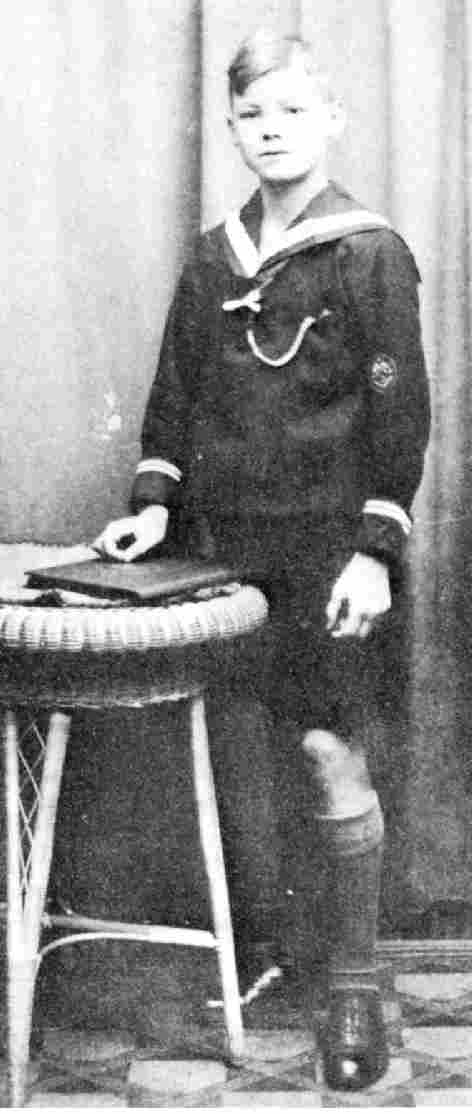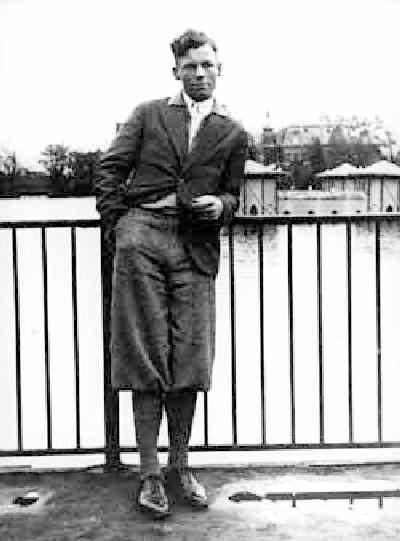
Figure 1.--Willy looks to be about 12 or 13 years of age in this photograph. He wears a short pants sailior suit. It would have been about 1925.


Figure 1.--Willy looks to be about 12 or 13 years of age in this photograph. He wears a short pants sailior suit. It would have been about 1925. |
Willy Brandt is the German statesman, whose leadership helped make West Germany a world power. The man today we know as Willie Brandt was born as Herbert Ernst Karl Frahm. He was raised by his mother, a sales woman in a consumer's cooperative, and his grandfather, a truck driver. They were ardent social democrats and Willy grew up in the worker's movement. He participated in the Socialist youth movement--the Valcon. His mother was fond of sailor suits and he often wore them. Even as a young teenager he wore short pants sailor suits.
Williy Brandt, born in Lübeck in 1913, was originally named Herbert Ernst Karl Frahm. His mother, Martha Frah, and grandfather Ludwig Frahm (1875-1934), are active in the social democratic worker's movement Lübeck. She is a simple woman, but devoted to the boy. Workers at the time were of Willy's birth were agitating for political influence in the conservative German Empire. Ludwig was like a father to the boy. Willy does not learn who is real father is until after World War I--a book keeper John Möller. His grandfather is an ardent socialist. in fact socialism is almost a religion to him. So much so that after Hitler's rise to power and his grandsons exile, Ludwig Frahm commits suiside, unable to continue living in the new NAZI Germany.
He was raised by his mother, Martha Frahm, a sales woman in a consumer's cooperative, and his grandfather, Ludwig Frahm, a truck driver. They were ardent social democrats and Willy grew up in the worker's movement. As early as 3-years of age he was participating in Socialist youth groups--in Willy's case a sport group. He later participates in a worker's mandolin club and appears on stage. As an older boy he participated in the Socialist youth movement--the Falcon. I knew that a lot of German political parties had youth movements--but I know little about the Falcon. I do not know, for example if they woire uniforms. Perhaps the Socialists obkected to uniforms.
His mother was fond of sailor suits and he often wore them. Even as a young teenager he wore short pants sailor suits. The appeal of sailor suits can be clearly seen here. They were quite acceptable in a Socialist household and had no militaristic conotations. Likewise they could be worn by boys from right-wing families. Many prominent NAZIs wore sailor suits as boys. Willie wears a dark blue sailor suit with a pullover middy blouse. The trim at least on the sleeve has two stripes. As an older teenager Willie wears knickers.
Willy was a gifted student. At the age of 15 in 1927 he completes his basic education, but receives a scholarship to the Lübeck Johanneum, a academic stimulating progressive high school. He becomes interested in politics to such an extent that they interfere with his studies. He begins writing political tracks while still in school. The school authorities counsel his mother to keep him out of politics. Willy joins various Socialist groups, objecting to what he views as the main Socialist Party's complacent attitude toward the rising NAZI Party.
After the NAZIs seize the Government in 1933m Bradnt secretly writes anti-NAZI tracts and stuffs then in mail boxes--a dangerous activity. He changes his name to Willy Brandt just to make it difficult for the NAZIs to find him. He joins underground cells, but eventually has to flee to Norway where he works with various Socilaists and anti-NAZI groups. He visits Germany secretly and works in Soapin during the CivilmWar. He flees to Sweden after the NAZIs invade Norway.
After the Second World War, Brandt became an important political figure of the then established Federal Republic of Germany (BRD, also known as West Germany).
He
was elected mayor of West Berlin from 1957-1966. In 1949 he was elected to West Germany's first legislature, serving in the lower house until 1957. Brandt first became
known internationally as mayor of West Berlin, from 1957 to 1966. He onitiated what he became bestvknown for--his Ost Poitik, openings to the East.
By 1961 he was the leading figure in the Social Democratic Party. He was disappointed that the Western Allies didn'r respond more vigorouslt to the wall. He was with President Kennedy when the President gave the "Ich bin ein Berliner" speech as was concerned that the crowd reaction might result in an indudent at the wall. In 1969 he was elected chancellor, and he retained this office in the general election of 1972. His work toward relaxing the tension between Eastern and Western Europe. His policy led to the signing of nonaggression pacts between West Germany and both the Union of Soviet Socialist Republics (USSR) and Poland in 1970.

Figure 1.--Willy is seen here at about age 15 or 16 wearing knickers. |
He continued pushing for openings to the east--not matter how small. In 1974, however, Brandt resigned assuming responsibility for the infiltration of an East German secret agent who was working on his staff. Willy Brandt was awarded Nobel Peace Prize in 1971 for his contribution to the relaxation of tension between Western and Eastern Europe (so-called détente or Entspannungspolitik).
Return to related pages:
[German boys clothes]
[German school uniform]
[German choirs]
[German movies]
[Hitler Youth movies]
[German ethnic clothes]
[German sailor suits]
[German tights]
[German royalty]
[German Scouts]
[Hitler Youth]
Navigate the Boys' Historical Clothing Web Site:
[Return to the Main Bio A-F page]
[Introduction]
[Activities]
[Bibliographies]
[Biographies]
[Chronology]
[Clothing styles]
[Countries]
[Contributions]
[Countries]
[Boys' Clothing Home]
